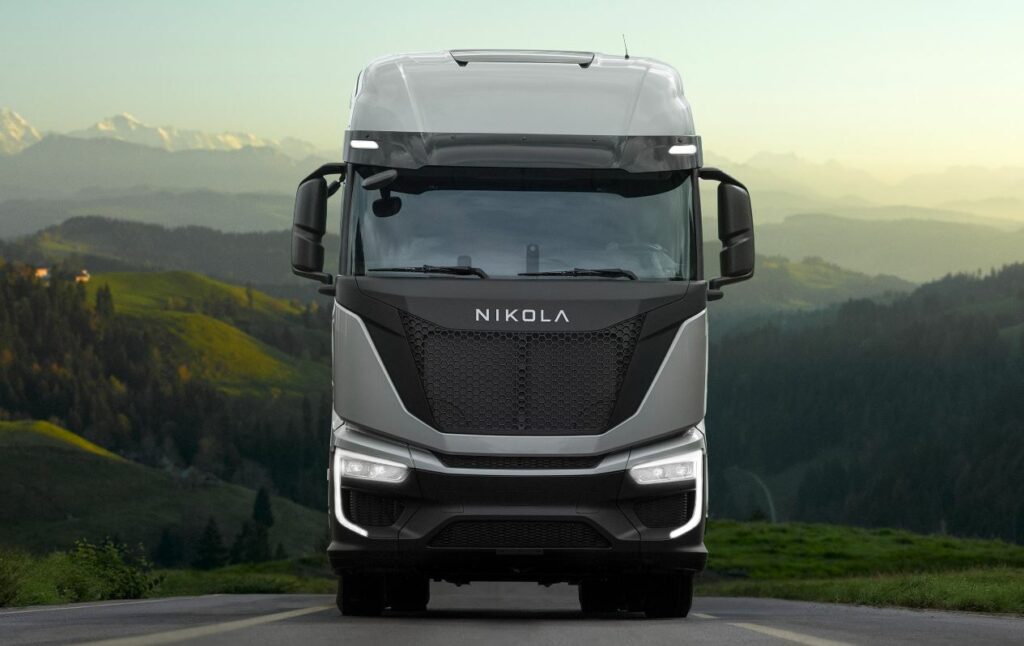With only three hydrogen refueling stations completed out of a promised 60, Nikola Corporation’s collapse is culminating in a mass auction of assets once touted as pillars of the hydrogen mobility revolution.
The liquidation, led by Gordon Brothers under Delaware bankruptcy court oversight, features 103 operational Nikola Tre FCEV semitrailer tractors—each offering a continuous output of 400 kW and an estimated range of 800 kilometers. Alongside these vehicles, the auction includes 65 complete fuel cell stack modules, batteries, DC converters, and technical equipment linked to hydrogen refueling infrastructure. Much of the inventory originated from the defunct Hyla project, Nikola’s failed venture to establish a proprietary hydrogen fueling network across North America.
Also listed: a fuel cell test lab and trailers for hydrogen transport—equipment that would typically be sought after by logistics operators or hydrogen integrators with existing refueling capabilities. Yet, the insolvency context is expected to depress asset prices, while logistical complexities around hydrogen infrastructure remain unresolved.
Nikola’s Hyla network was central to its vision of vertically integrated hydrogen trucking. By 2026, it had planned to establish 60 refueling stations; only three materialized. The primary failure points: capital constraints, slow-moving infrastructure permitting, and underwhelming market demand. Lucid Motors acquired Nikola’s Arizona factory and headquarters in April 2025 for roughly $30 million, marking the first major asset departure. Now, the final components—those essential to hydrogen vehicle operation and refueling—are on the block.
The Hyla project’s premature demise reveals structural issues that extend well beyond Nikola itself. Hydrogen trucks remain challenged by infrastructure deficits and a thin network of buyers willing to invest in alternative fuels when diesel remains the dominant, cost-effective incumbent.
Lessons for Hydrogen Investors
Nikola’s $200 million quarterly loss at the time of collapse exemplifies the cost of misaligned business models in early-stage energy transition sectors. The firm’s approach—owning both the vehicle platform and fueling infrastructure—demanded a scale and liquidity it never achieved. Unlike firms such as Hyundai or Toyota, which partner with public or state-led hydrogen consortia, Nikola’s vertical integration left it exposed when capital dried up.
Yet for operators already embedded in hydrogen logistics or with long-term infrastructure plans, the auction offers a rare opportunity. Acquiring components such as fuel cell stacks or trailers at distressed prices could accelerate smaller, decentralized projects. Still, such acquisitions will be strategic rather than speculative. Buyers will likely be those who can sidestep the financing bottlenecks and already have off-take agreements or public-private infrastructure deals in place.
Nikola’s downfall is not an isolated misstep; it reflects deeper friction within the hydrogen freight segment. Despite technical readiness in areas such as range and output, market traction has lagged behind R&D advancements. The infrastructure inertia—permitting, land use, pipeline logistics, and refueling economics—remains the industry’s bottleneck.
Meanwhile, in other regions, hydrogen truck rollouts have taken a more measured path. In Europe and East Asia, where public funding for hydrogen corridors remains steady, pilot projects have more successfully transitioned into commercial operations. The dissonance between these regions and the U.S. context raises critical questions about policy harmonization and industrial alignment in scaling hydrogen technologies.
Stay updated on the latest in energy! Follow us on LinkedIn, Facebook, and X for real-time news and insights. Don’t miss out on exclusive interviews and webinars—subscribe to our YouTube channel today! Join our community and be part of the conversation shaping the future of energy.





